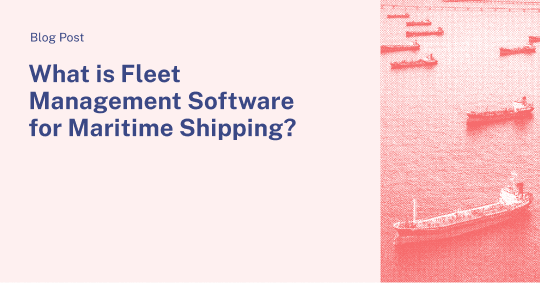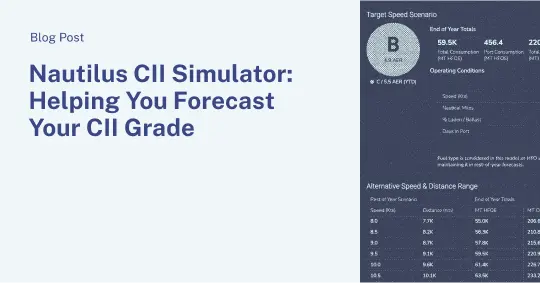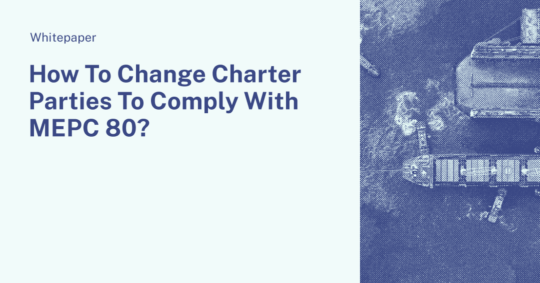What is MEPC 80?
MEPC stands for ‘Marine Environment Protection Committee’ and it looks at the environmental issues that fall under the remit of the IMO (International Maritime Organisation). The MEPC looks at a wide range of topics, from ship-source pollution to ballast water management and recycling aboard ships.
But of particular interest to owners and charterers is the MEPC’s involvement in reducing greenhouse gas emissions (GHG) from the maritime industry. And this came to a head last week with the 80th session of the MEPC, which set a series of targets for maritime greenhouse gas reduction.
What Are The Emissions Targets From MEPC 80?
Following days of discussions and negotiations between the member states that make up the committee, MEPC 80 delivered the following targets for the shipping sector to reduce GHG emissions:
- By 2030: Reduce GHG emissions by 20% – 30% (as against 2008 levels)
- By 2030: 5% – 10% of energy used by international shipping to come from zero or near-zero GHG emissions technologies
- By 2040: Reduce GHG emissions by 70% – 80% (as against 2008 levels)
- ‘Close to’ 2050: Reach net-zero GHG emissions
On the face of it, these targets are a huge step forward for the maritime sector and its goal of reducing GHG emissions from ships. But the challenge is that these targets fall short of what’s needed to align with the IPCC’s (Intergovernmental Panel on Climate Change) targets of what’s needed to keep global warming under 1.5°C, based on the Paris Agreement from COP21. These targets represent a much stricter reduction of 37% in 2030 and a 96% reduction in 2040.
This means that it is highly likely the MEPC 80 goals will change over time to become more ambitious, especially if the climate crisis worsens. This presents ship owners, charterers and the wider sector with both an opportunity and a challenge. The opportunity is that they can start addressing maritime GHG emissions now, before even stricter targets come into play. The challenge is going to be hitting these targets, even with the current MEPC 80 goals.
Will The Maritime Sector Hit Its Emissions Targets?
Like many other sectors, the shipping industry has a big job ahead of it to reduce GHG emissions to the level they need to be to prevent runaway global warming. And like many sectors, there is no single solution for reducing carbon emissions.
While the benefits of zero carbon marine biofuels and zero carbon ships are often touted, these aren’t quick fixes. Green fuels are still very new, the infrastructure is not up yet at scale and it can be an expensive undertaking to retrofit a vessel to use them. And it takes many years to design and build a new vessel type, let alone a zero emissions ship.
Zero carbon fuels and vessels will eventually be the main way we reduce shipping emissions, but on their own they won’t do the job, especially in the short term. So what’s the answer?
As the UCL UMAS (University Maritime Advisory Service) points out in its MEPC 80 analysis, ‘Meeting the 2030 target will require either a maximisation of efficiency options, or a combination of significant efficiency and some use of alternatives to fossil fuels.’
So it is clear that one of the biggest targets for ship owners and operators is to improve the efficiency of their vessels. In fact, in modern shipping, the need to improve vessel operational efficiency has never been greater, both from a commercial point of view (as fuel gets more expensive) and from an environmental point of view. Achieving even 3% – 5% efficiency gains is going to be a top priority, and will put owners and operators in a good position for the inevitably stricter emissions targets.
How Can Ships Reduce Their GHG Emissions Now?
Hitting the 2030 targets will require a combination of efficiency savings and alternative fuels. But using alternative fuels isn’t a cheap option, especially as MEPC 80 has said their carbon impact now needs to be assessed on a ‘well-to-wake’ basis. For example, ‘Green’ ammonia or hydrogen is much more expensive than their fossil-fuel derived counterparts.
At the same time, owners can’t immediately start refitting their entire fleets with energy saving devices or engines capable of handling zero-carbon fuels. As a result, efficiency savings have to be the starting point for many ship owners when it comes to reducing their carbon emissions.
Being able to improve efficiency is now no longer a ‘nice to have’ – it is a necessity. All ship owners (together with operators) need to start understanding how they can make their vessels more efficient to reduce fuel consumption and reduce carbon emissions.
The good thing is that there are a number of steps that can be taken immediately to deliver efficiency savings for fuel consumption. But, these efficiency savings are only possible if the industry starts taking a forward looking approach to all aspects of shipping.
For example, a good starting point for reducing fuel consumption is to choose more efficient routes, slower sailing speeds and optimized arrival times. But this can only be achieved through a combination of technology (high-frequency sensors and advanced vessel simulations) combined with dynamic charter party agreements that provide greater flexibility around vessel speeds and arrival times.
Equally, data is needed so that owners can track the performance of their entire fleet to see how efficient it is (especially against external measurements like the IMO’s CII (Carbon Intensity Indicator) grading.
And by putting the technology and systems in place now to measure vessel performance and reduce fuel consumption, owners and operators will be in a better position to track fuel savings and emissions reductions that come from energy saving devices and zero-carbon fuels.
Nautilus Labs is one of the only companies in the market that is already providing all of these solutions. With our Voyage Optimizer solution, operators are able to create fuel efficient voyage plans using real-time weather data and vessel performance data. Our Fleet Essential product allows owners to see the performance of their entire fleet and ensure it is on target to hit emissions goals. And our Green Charter suite of products uses virtual simulations of vessels (‘Digital Twins’) to create dynamic charter party clauses that are geared towards collaboration and emissions reductions, rather than the traditional adversarial charter party relationship.
What’s Next For Reducing GHG in Shipping?
Owners and operators have known for a while that they need to reduce GHG emissions from their vessels. But the targets set out by MEPC 80 have made emission reductions a much more immediate priority.
The key to addressing GHG emissions for owners and operators is to look at what they can change now. Zero-carbon vessels and fuels are a long way off. And energy saving devices take time to fit. But there are immediate efficiency savings that can be implemented.
Ultimately, efficiency savings are within the grasp of every owner and operator. But they need to start thinking about improving efficiency and tracking vessel performance now, otherwise they’re going to face an uphill struggle when they’re forced to do it in a decade’s time.
If this is a challenge you’re now facing, and want to improve the efficiency of your vessels and routes, speak to us today.


